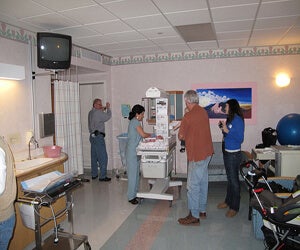
The birth of a child is most certainly a momentous occasion, one that deserves to be recorded somehow. When I was born, video cameras were not yet available to the general public, so my parents recorded all my infant milestones in a special notebook: first word, first step, etc. Today, though, almost a quarter of a century later, we have the technological capability to record everything in minute detail with a device that fits in the palm of our hand, even the labor. It is this last part that has certain hospitals worried, causing them to prohibit all kinds of recording during the delivery process. The evolution of video and the web does call for some alarm, since we can never know what pieces of our lives will end up on-line, nor who will be doing the recording. However, these technological advances also provide wonderful opportunities to save and re-live precious moments, which would otherwise be forgotten.
Hospital delivery rooms in particular are becoming the central arena in this battle, mainly because of the sensitive and personal nature of the service they render. On one side are worried mothers like Laurie Shifler, arguing that it is their right alone to decide whether or not they want to be filmed giving birth. Shifler was so outraged by the refusal of her local hospital to allow recording in the delivery room that she launched an online petition and generated major headlines in the media. On the other side – doctors, nurses, and other healthcare professionals counter with privacy and safety concerns, and, despite the apparent stance against progress, they do bring up valid points. Aside from the obvious fact that the medical staff may have no desire to be in the film, an excited would-be father sneaking in between the doctors and nurses for a better shot does pose a serious safety concern. Hospitals are also worried about such videos being used (and misinterpreted) in potential lawsuits. MLMIC, a malpractice insurance company, recently issued a memo, warning hospital administrations of the risks involved in allowing video in the delivery rooms.
While both sides present valid concerns, I have to say, that this debate is largely artificial and blown out of proportion. After some careful investigating of the issue, I found that most sources point to the same incident between Mrs. Shifler and the Meritus Medical Center in Maryland. No analogous cases received such an amount of public attention because, as some digging through public internet forums revealed, most upcoming mothers are more worried about their child being born healthy and without complications, rather than capturing the process on video. Personally, if it was my wife giving birth, I would not be worried much about video either. Some quick phone calls to the maternity wards of Maimonides and Presbyterian hospitals in New York revealed that they also do not allow video recording in the delivery rooms, and guess what? There is no ruckus being made by expecting mothers, no petitions being passed around, and no marches across Manhattan in support of the parents’ right to record. All this leads me to believe that the recent case in Maryland is just that – a single case, and not the pressing national issue that most publications are trying to make it out to be.
Perhaps, instead, what we should be discussing is the more global role recording is taking in our lives in general. We have already covered the concept of life-logging, which is becoming more readily available to the average Joe with each passing day, and it does raise some exciting opportunities. We humans have always felt the need to leave some mark after ourselves, perhaps as proof to our descendants that we really existed. The entire field of archeology exists simply out of the curiosity and desire of knowing what exactly came before us. Well, with the leap-and-bound advances of recording technology, that task is going to become much easier for future generations.

And while delivery rooms are still a legal and moral grey area, let us examine what recording is already making possible in other spheres. Life-logging is more than just preserving current events for our descendants’ historical curiosity. It allows us to actually experience history directly, as Neil Monday did three weeks ago, capturing the last flight of the space shuttle Discovery on his mobile phone camera. Today’s powerful recording technology made it possible for Monday to make the Discovery flight much more personal, a small piece of his own life rather than just some obscure historical event, and all he had to do was be in the right place at the right time, and, of course, quick on his feet.
Life-logging lets us watch how someone changes growing up, day by day, again and again, if we so wish. It lets us record every place we have been with astonishing frequency, creating a rich collage of every day of our lives, as Wafaa Bilal, the NYU photography professor, has. The point is, life-logging can be applicable on all levels of life, whether we are doing the recording only for a family archive, as some sort of avant-garde art project, or even for the lofty goal of preserving a picture of today’s life for future historians.
Of course, we have yet to work out the legal boundaries associated with this new concept. As the Shifler case has shown us, there are some places where recording may simply be inappropriate, if not outright dangerous. There are also numerous privacy concerns: the NYU administration, for example, makes Wafaa Bilal close his camera when he is on campus. However, I expect that by the time all of these kinks are ironed out, both technology and public enthusiasm for life-logging will be on a much higher level, dramatically changing our lives from what we know today.
[Image Credit: Max Hanley, Jean-Babptiste Labrune]
[Source: New York Times, MLMIC, Melophant Forums]


